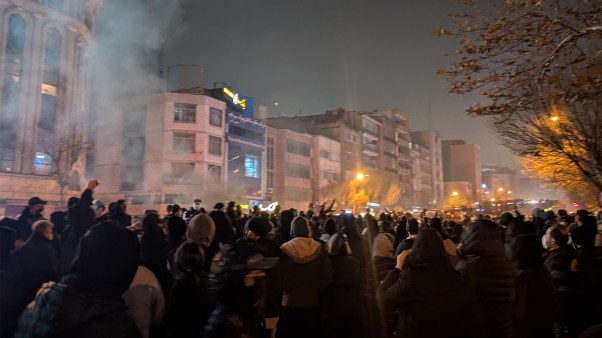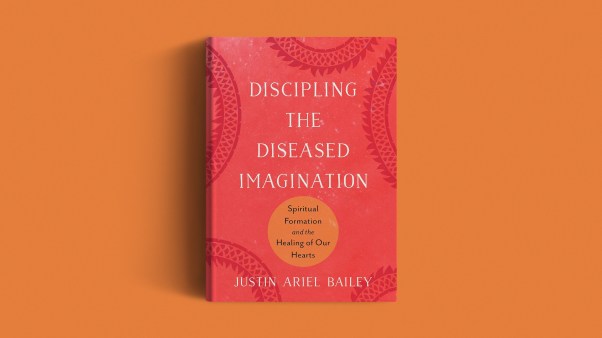Our family is a bit raw this week. Packing your whole life into a U-Haul and leaving behind everything called “home” has a way of putting everyone on edge. We moved several times during my childhood, but this was my first time doing it as a father. I remember moving to South Florida in the third grade—the tears, the uncertainty, the upheaval. It’s been hard to watch a familiar sorrow swell in the eyelids of my own kids.
As fathers, we dream of passing down wisdom, character, and faith, but so often we end up leaving our children an inheritance of pain, hurt, and unfulfilled longing. In his latest offering, Lament for a Father: The Journey to Understanding and Forgiveness, prolific author and longtime World magazine editor in chief Marvin Olasky reflects on this mixed blessing. “Many people … have unresolved conflicts with dads, living or dead,” he writes. “So do I.”
Olasky styles the book as an elegy for his own dad, a father “simultaneously present and absent.” It’s a work so particularly about one father that it ends up being about every father.
Who is to blame?
Eight brief chapters piece together a mosaic of Eli Olasky, a son of immigrants who grew up in a Jewish ward of Malden, Massachusetts, just outside Boston. Using the present tense, the author narrates the life of a school principal with a Harvard degree who settles into a life of comic books, bridge, frequent job turnover, and disappointing his wife. Aloof and stoic, he shows a mysterious lack of ambition.
A sense of melancholy weighs heavily over the entire book. The discoveries the younger Olasky digs out of Harvard archives, newspaper clippings, and family photo albums give his prose the yellowed edges of a son who would rather have known his father in his own words. Chock full of details from a distinctly Jewish upbringing, Olasky’s vignettes benefit from a pen sharpened by decades in magazine editing:
In 1957 we drive down US Route 1 to Hollywood, Florida, where my father will be the principal of a Hebrew school that students attend after public school lets out. One night we eat at a Howard Johnson’s. The table looks a lot like the one we have at home, with the same laminate surface. My father orders a hamburger and a wedge of iceberg lettuce. No ketchup or mustard on the burger. No dressing on the non-salad salad. My mother orders beef burgundy.
I request a small wedge of lettuce and a child’s hamburger. Since we eat only kosher meat at home, I ask the waitress if it’s kosher. She laughs and walks away. My father says it isn’t. I ask, “Why are we eating it?” He says, “It’s not important.”
It’s funny what memories a son’s mind latches onto when it’s starved for a father. The older Olasky was always dodging his son’s probing queries with that same refrain—It’s not important.
The author unpacks his taciturn father’s past one dusty box at a time. He learns of the antisemitism he had to overcome to gain entrance to Harvard. He begins to comprehend his father’s love-hate relationship with his Jewish heritage after discovering the philosophies he encountered in college. He realizes that his detached father probably spent a lifetime coping with the horrific sights, smells, and sounds he brought home from concentration camps he saw during the Second World War. “Like many of his generation,” Olasky writes, “my father never spoke of his World War II experience. Like many of my generation, I didn’t ask.”
Olasky dignifies every unfolding detail of his father’s life like a skilled mortician. He chronicles the slide of his parents into middle age. They fight a lot, particularly over his father’s underachievement, and his mother fends off fatalism with the interjection, “I’m not going to end up like my mother!” Both hope their two boys will provide redemption for the family’s shortcomings. With wistful hindsight, Olasky writes, “That does not happen.” His father’s career disintegrates into administrative temp jobs while the son completes graduate school: “I don’t know anything about that, but I don’t ask.”
His tale concludes with the sentiment, Who should I blame? When fathers and sons have poor relationships, when families fall apart, who is at fault? The author warns, “Scapegoating is an occupational hazard for writers of family history: It’s easy to blame parents.” Part of Olasky’s recent journey as a son has been learning of all the sin, abuse, and trauma his parents suffered in their own lives:
I’ve realized in the course of this research how self-centered I was, not only as a child but as an adult. Why did I have so little interest in seeing my parents not primarily as people to meet my needs (or not), but as individuals with their own struggles? I never really cared to find out about them.
In these sheepish confessions, Olasky reiterates the book’s main thrust: Fathers and sons are meant to know and to be known by one another. He gives sons this bit of advice: “Persist in questioning while your father is still alive. Don’t take no for a final answer.”
As I was packing up our shed this past week before our move, my nine-year-old son unloaded a barrage of questions: “What’s that called? What’s it for? Where does it go?” I was hot, sweaty, and annoyed, so I began to respond with sarcastic non-answers meant to discourage further inquiry.
I read Olasky’s exhortation later that afternoon, and I had to go find my little boy to apologize. I never want to hinder or discourage his searching heart. Those persistent questions are the outward expression of a little soul that longs to know his father.
A together misery
In Lament, the author realizes that his father’s reticence may have stemmed from a desire to shield his son from trauma, pain, or personal sin. As fathers, it can feel shameful to be so known. Our kids see us at our worst; they know our bald spots better than we do. Rather than leaning into this intimacy, we can recoil from embarrassment and push our kids away. However, in hiding our flaws from our children, we hide ourselves.
One quibble readers might have with Olasky is that his lament ends abruptly with almost no conclusion or application. At only 100 pages in length, another chapter easily could have been justified. I’m sure readers would appreciate a few more reflections on what Olasky learned from unearthing his father’s past—and what he might have us learn.
But perhaps that is part of the point. Perhaps Olasky is resisting the trivialization of his father’s existence by boiling his life down to a few chirrupy lessons. The focus on the lost details of his father’s history—facts recounted without much commentary or digest—seem to be his way of saying, Eli Olasky has value not because of what he gave me or what he taught me but simply because he was my dad.
It is a human impulse to try to make sense of our bewildering tragedies by stringing together some greater purpose on our own—an artificial connecting of the dots to forge some cheap closure for ourselves. Olasky’s Lament refuses to do so. His elegy remains unresolved. Leaning into the dissonance of human sorrow and divine sovereignty, the author will not let God off the hook. Mankind cannot redeem his sorrows. Only God can—and he must.
The Olaskys of Lament for a Father lived a story so oddly specific and yet so eerily familiar. We all have moments where we see devastation in our relationships and say, “I wish it were not so.” Is this not the throb of the Christian heart in a world not yet fully redeemed? Commiseration is the point of lament. A together misery . A shared sadness. Lament is an invitation: Be wretched with me. Our sorrows are not all the same, but they are a part of the same fallen world.
My son and I were driving the moving van this weekend, a sieve of fresh-picked blueberries between us—the last vestige of the home we were leaving behind. As the miles passed, I regaled him with tales from my childhood: places I’d lived, friends I’d left behind, hardships I’d endured. Olasky’s encouragement echoed in my mind: “Even if it seems too late, it’s not.”
Fathers, find a place, an activity, a time, where you feel comfortable sharing yourself with your children. Ask Marvin Olasky, or any son who has lost a father. They know in their bones that this is true: Our kids don’t want a perfect dad; they just want Dad.
Chad Ashby is a graduate of the Southern Baptist Theological Seminary and Grove City College. He currently teaches literature, math, and theology at Greenville Classical Academy in Five Forks, South Carolina. He blogs at After+Math.










